Hello everyone!
This is a guide about quotes and quoteblocks (like above) - when to use them, how to write them, and what they can do for your worldbuilding. Quotes are a great tool to help tell the story of your article from different perspectives, and give it a sense of depth or connection. If you've never used them before or are looking for some pointers about how to approach them differently, this one is for you.
If you have any questions about they function purely from a BBCode or CSS perspective, check out the Codex article about them:
Quotes: What are they good for?
So, why use quotes?
Zoom In
Quotes lets you zoom in on some very specific detail about the article you are writing - a belief, a quirk, a general vibe - that it might be impractical to get into the article's general text.
Ex. 1
From the article: Saen-Kaw
Here, the quote is being used to talk about a specific strategy within the sport, in a section about how the sport is generally played.
Ex. 2
From the article: Shikei
Zooming in with quotes can be a great place to put in saying, phrases, or things people say and do in the setting. In Shikei, a funeral tradition involving the skull, the quote shows you peoples' perspective on people who are seen as crass and materialistic.
Ex. 3
From the article: Pacts
Like the second example, this one is about people's perspective, and how they might interact with something day to day. Asking about someone's deal with a metaphoric or literal devil, in this case, is not good small talk.
Zoom Out
The opposite of zooming in, quotes can also be used to provide a broader context to the article - how it's seen or used or interacted with by the setting as a whole, how it has changed with time, or how it ties into other, wider element... But doesn't quite fit into the main text or could benefit from standing out, or when it's more interesting trivia than anything.
Ex.1
From the article: Dreams
In the dark occult world of Shedim, dreams are visions of glories from beyond the limited view of day-to-day lives... And this quote is about how that has interacted with pop-culture and a magical oddity become integrated into the "normal" world, unknown by its inhabitants.
Ex. 2
From the article: Kagarai
In this geography article, the quote connects one of its regions to the phenomena of Blight, the Blight-Trackers who interact with it, and provide a wider glimpse into how the place might be used by people in the setting.
As a general rule, quotes can be used to connect the article to things that would otherwise be outside its scope, either by being very specific or very broad. If you are trying to tell a story across several articles, quotes can also be something that ties them together.
Flavor & Fun (or: Character)
My personal favorite is to use quotes to imbue your setting with a sense of character. Regardless if it's spoken by a character in the setting or a more general quote about something in it, it can be an excellent way to establish and reinforce the character of your world as a whole. If the rest of article is mainly concerned with explaination or information, quotes can be a place to introduce flavor and fun.
Ex. 1
From the article: Promotions AND
We Believe In Open Spaces by
Julian Ralid
Julian uses a quote at the beginning of each article from Abby, an artificial intelligence/hologram personality supposed to "help" new employees in this hilarious/dystopian corporate nightmare setting. It both reinforces the tone and themes of the setting, gives the reader a personality to follow along with, and gives us an overview of the article's content. It is a great way to use them.
And sometimes, you just want to have some fun:
From the article: Raffleraptors
It is something you can really get creative with, using quotes from movies or songs. If the reader has fun reading, it's more likely they'll keep doing it.
From the article: The Moon Wants To Murder You - Fact or Fiction?
Narrative
Quotes can also be a good way to tell a story about whatever it is your article is about, or the events surrounding it, from a more personal perspective. Journal entries, battlefield reports, letters back home, or even just conversation as characters go through whatever horrors or wonders you've thrown them into. Some worlds use this as a sort of narrative device, like Krap Inc or the Warhammer Fantasy bestiary, where a single author is describing things from their in-world experience.
Ex. 1
From the article: The Ziggurath
The Ziggurath quotes tell the story of a expedition into that particular area through the eyes (well, letters) of the expedition leader, sort of starting and beginning at the end. If you are going to make a place or thing seem particularly fearsome, let the people who fear it talk about it.
Formatting
Quoteblocks are excellent for breaking up the flow of an article, highlight important bits of information by sepearating it from the rest of the text, and make an article look less intimidating by providing nice seperating points. It lets you avoid the entire article looking like a single wall of text, and helps you put emphasis on particular parts of the article or information about it.
For more information on formatting stuff like that, check out my other handy-dandy World Anvil Guide:
Mechanics
A trick you often see used in RPG setting books is to use quote blocks to give rule and mechanical information interspersed with flavor text. It lets you keep a bit of seperation between the game and the immersive text, and keep the flow going. Others use it to emphasis some rule that might fall outside the scope of that particular creature, region, or item, but still integral to or introduced with it.
Ex. 1
From Wraith: The Oblivion - Into the Labyrinth
Here, the book is using a quoteblock to provide some hard rule information in what is otherwise a section dedicated to story and immersion. The contrast of color makes it stand out and if you're more interested in one or the other, easier to either focus on or ignore.
Ex. 2
From Kobold Press - Tome of Beasts 2
Under a monster entry in the Tome of Beast 2, Kobold Press introduces a Curse into the wider world.
Writing Quotes
I often quote myself. It adds spice to my conversation.
— George Bernard Shaw
Like any writing, quotes is about finding your voice and doing what works for you. The following is what has worked pretty well for me... But I probably also break my own rules at least 40% of the time. Once you know what rules you apply to your quote-writing craft, you know when and why to break them.
Not Too Long
Like a joke, a good quote shouldn't be too long and punchy is often better. If your quotes are too long, they can drag on or becomes a distractingly large chunk, and detract from the substance of your article, rather than adding to it. Unless there are reasons to extend it, I try to stick to a couple of sentences and ideally a single one.
Ex. 1
Reality is frequently inaccurate.
— Douglas Adams
Clarity
Whether short or long, strive to be precise.
As a general rule, I've found it useful to avoid using accents. Unless handled carefully, they can at best be confusing or unclear, and at worst insensitive. Some light accentin' might work well, but tread carefully otherwise.
Using in-universe terminology is both useful and a potential danger. It is unlikely that the inhabitants of a fantasy world would use words, phrases, or sentiments we do (for an example, DNA, or heck - even germs might not be conceptualized). On the other hand, it's easy for a quote to become a jumble of invented words that has no inherent meaning to the reader. Unless you've just introduced a phrase or word before the quote, try not to use anything you aren't confident the reader would understand.
It can be tempting to use fancy fonts when writing something like a letter or journal entry - resist the urge. It doesn't matter how great the quote is if the font makes it difficult to read.
Context
Connect your quote to what it is about by using it near to its subject: before, as an introduction, or right after. The closer it is, the more immediate the connection, the more likely it is to make sense. A quote that is about A but in several paragraphs later can be confusing for a reader.
If you are scattering quotes with a common narrative throughout an article, you can create the same context by referencing the story elements or keeping the same narrator.
You can also create context in a broader sense by using the same personalities in similar articles. If you have a post-apocalyptic wasteland outside the city, having the same explorer (or small cadre of personalities) be the author of the quotes both creates a connection to the character and to the wider world through their eyes. You can see this in Magic the Gathering card, where many flavor texts goes back to the same characters describing either the card or some aspect of story.
When and Where
So, when and where should you put quotes?
Use Sparingly
Like seasoning, quotes are best used in measured amounts.
Emphasis
If you want to emphasis a particular part of the article, quotes can give them additional emphasis on it. The quoteboxes tend to stand out from the regular flow of text and draw the eyes of readers.
Open and Closer
This is more of a personal preference, so take it with a grain of salt. I like to use quotes to open an article, to give it some flavor and character - to provide an immediate hook for the reader to get interested in or amused by. For much the same reason, I also use them at the start of each section (in this case, every header1) as a introduction, and as dividing boxes throughout each section - usually 1 or 2, depending on the length of the article.
I've found it useful to also end an article with a quote - something thematic and exciting, a storyhook or cliffhanger so readers can leave the article feeling excited about something else in the world... Hopefully!
Out Of Place
Like zooming out or in, use quotes when there is a piece of information you want to convey, but doesn't quite fit. Maybe it would mean getting bogged down into details in a way that would disrupt the flow of the article, or be connected to a broader narrative about your world that needs to be connected in.
When Not To
Always remember that quotes are just a tool you can use for your worldbuilding and formatting. Use them when you feel they benefit your particular style of writing, and discard them when they don't.
Happy worldbuilding!







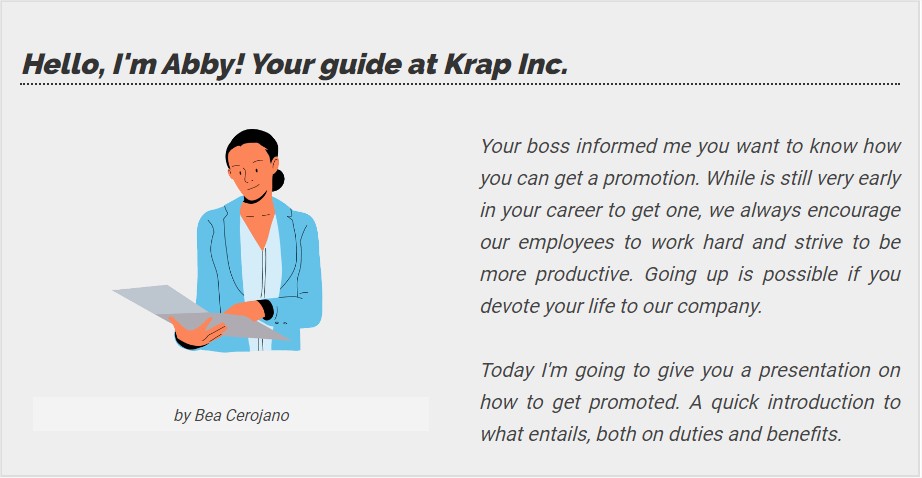
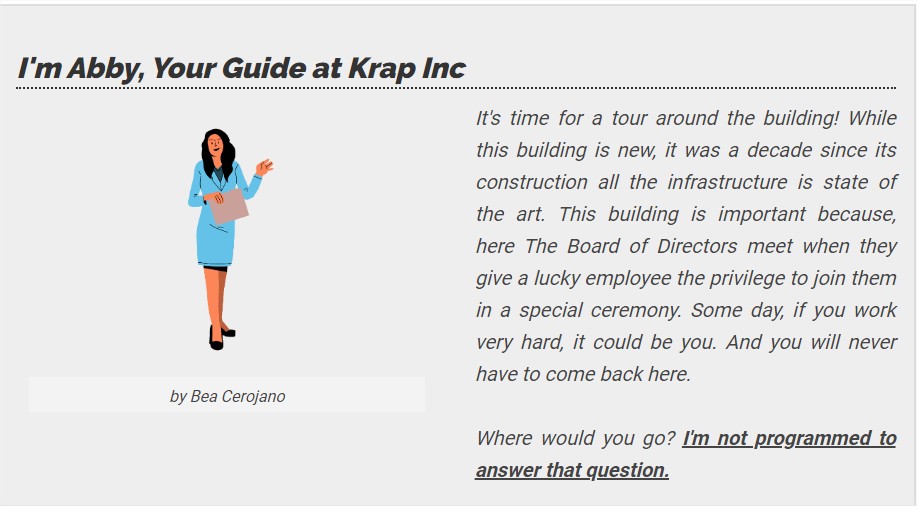

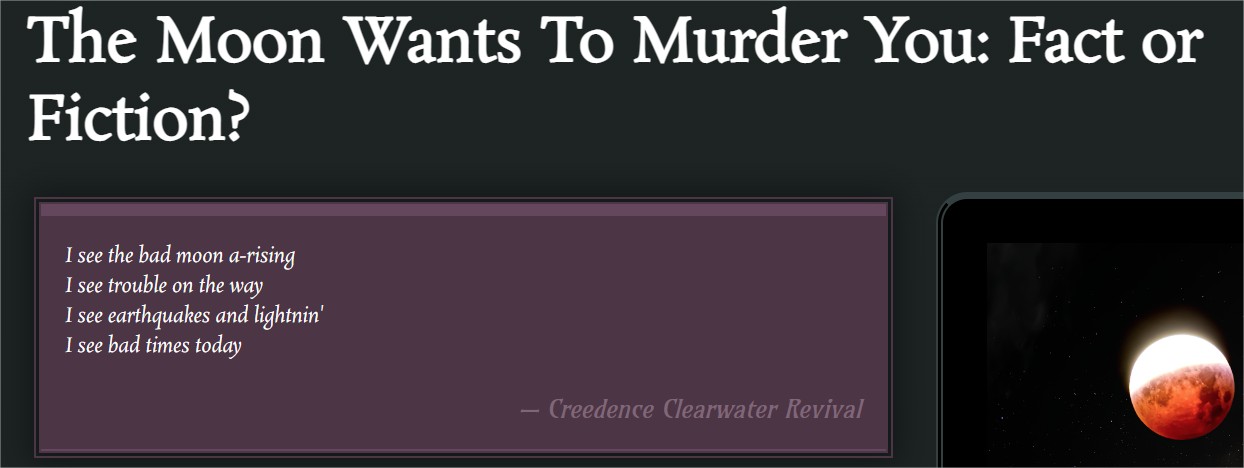


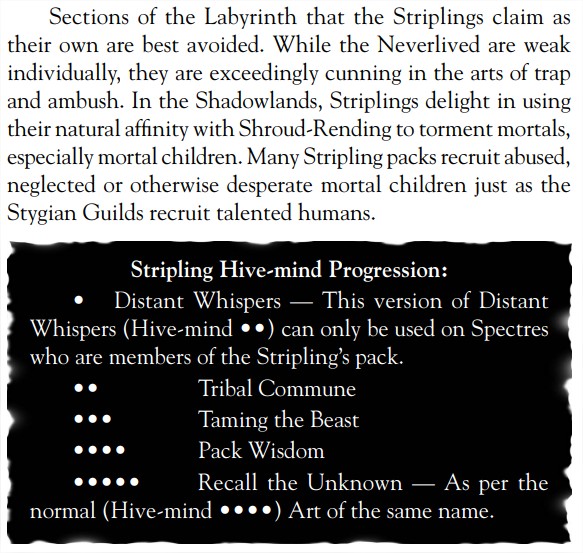





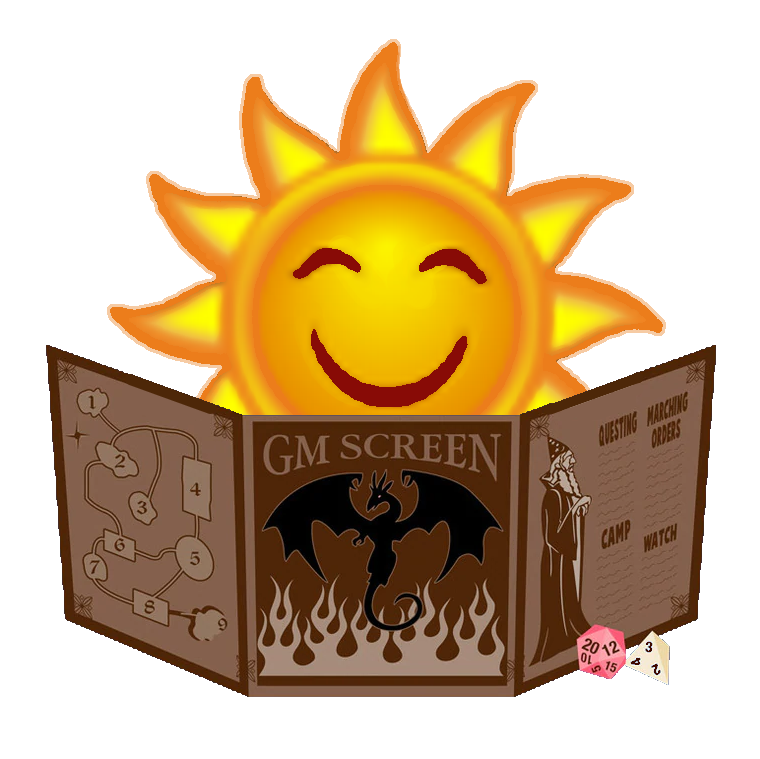

Really great advice. I love all the different examples you have used. :D
Thank you <3 :D
Creator of Araea, Megacorpolis, and many others.